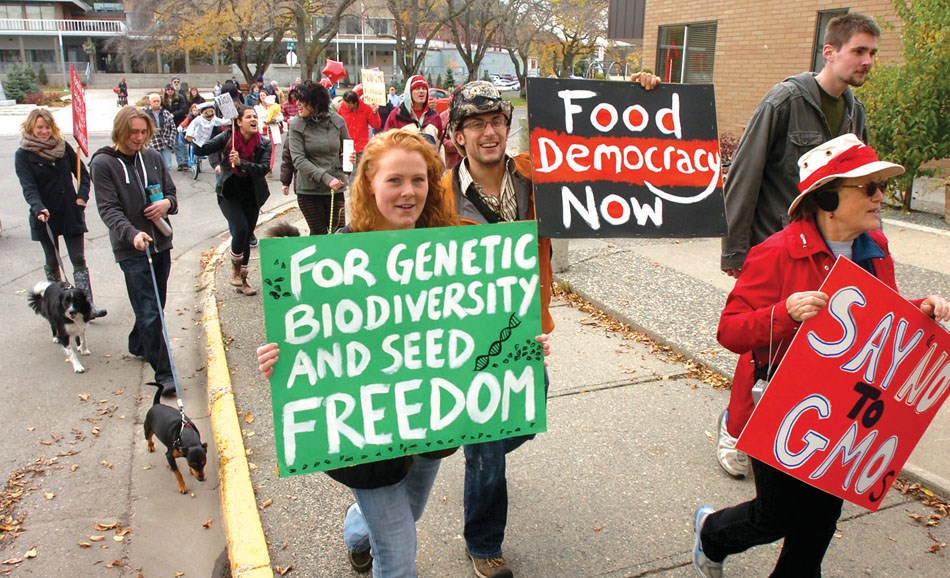Approximately 50 people marched on Saturday to show their concern about the use of genetically-modified food.
The Prince George march was one of 558 March Against Monsanto events planned across the globe on Saturday. Local organizer Karmjeet Manhas said he wants to see Canada restrict the use of genetically modified organisms (GMOs) in food products -like many European Union countries -or at least make labeling mandatory.
Partial bans are in place in 16 countries and 62 countries currently require GMO foods to be labeled, according to March Against Monsanto international organizers.
"The concerns about GMOs sound like a conspiracy [theory], but it's all real -it's absolutely true," Manhas said. "We just want to say we have the right to make a choice."
GMOs are plants or animals which have had their DNA altered through genetic engineering to change certain characteristics - like increasing resistance to pesticides, diseases, pests or environmental conditions.
Companies like agribusiness giant Monsanto are tinkering with millions of years of natural evolution, Manhas said.
According to Health Canada, all genetically-modified food products are subject to a scientific pre-market safety assessment. Genetically modified foods found to be safe are not required to be labeled, under Canadian regulations - although a voluntarily labeling program exists.
However, Manhas said, many people -including members of the scientific community -have questioned the research showing genetically modified foods are safe.
"It's important because it's in our foods without labels," march participant Sara Duncan said. "It should be eliminated, or at least a lot more monitored."
Registered nurse Alyssa St. Peter said she is often surprised by how many people are unaware of the prevalence of genetically-modified foods.
"I'm a nurse and I work with people who are very health-oriented. But I talked to people and four or five didn't even know what GMOs are," St. Peter said. "The health of our population has been declining over the years, and it shouldn't be. It should be getting better."
Brandon Cote said Canada should follow Europe and Mexico's decisions to heavily restrict use of GMOs.
"How many countries have banned GMO? [And here] It's the majority of what is on our shelves," Cote said.
According to the International Service the the Acquisition of Agra-Biotech Applications (ISAAA) - a GMO advocacy organization - more than 90 per cent of canola planted in Canada in 2009, and 96 per cent of sugarbeets, were genetically-modified. In 2009, a total of 8.2 million hectares of farmland in Canada was dedicated to genetically-modified crops of canola, soybeans, corn and sugarbeets.
In the U.S., 80 to 85 per cent of corn grown in genetically modified.
Globally, 77 per cent of soybeans, 49 per cent of cotton, 26 per cent of corn and 21 per cent of canola crops were genetically-modified strains in 2009, the ISAAA reported.
"Biotech crops can play an important role by contributing to food self-sufficiency/security and more affordable food through increasing supply (by increasing productivity per hectare) and coincidentally decreasing cost of production (by a reduced need for inputs, less ploughing and fewer pesticide applications) which in turn also requires less fossil fuels for tractors, thus mitigating some of the negative aspects associated with climate change," the ISAAA wrote in a 2009 report.
"Of the economic gains of $51.9 billion US during the period 1996 to 2008, 49.6 per cent were due to substantial yield gains, and 50.4 per cent due to a reduction in production costs. In 2008, the total crop production gain globally for the four principal biotech crops (soybean, maize, cotton and canola) was 29.6 million metric tons, which would have required 10.5 million additional hectares [of farmland] had biotech crops not been deployed."



